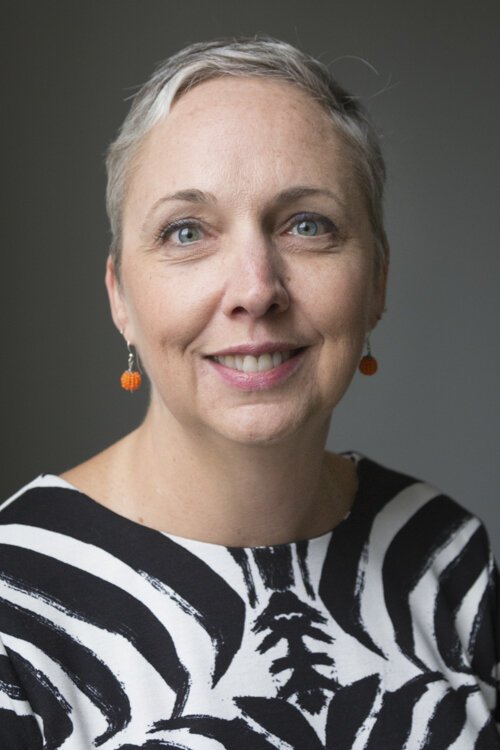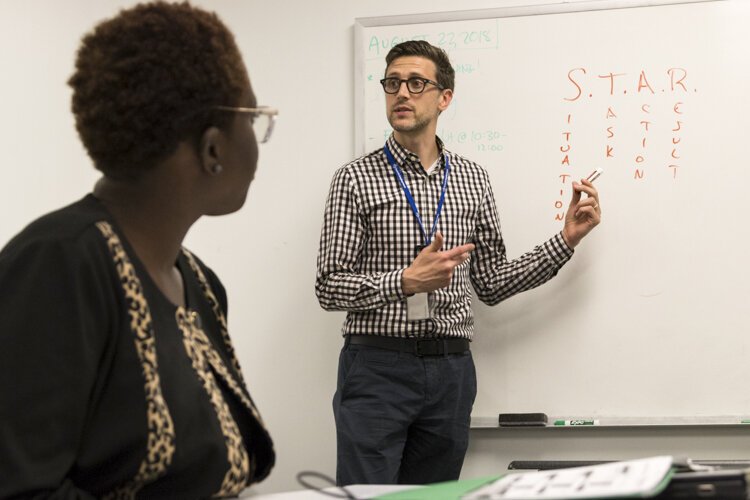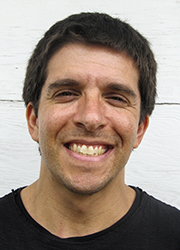Y.O.U. brings jobs, financial freedom to underserved Northeast Ohio youth
This is the latest story in FreshWater Cleveland's series First Suburbs: A Closer Look, focusing on the suburbs surrounding Cleveland. Built mostly before the 1960s, these “first” suburbs face challenges ranging from urban sprawl to disinvestment. But shrinking news coverage reports mostly on crime. This series instead will look at the unheralded people and innovative programs that are making a difference, through a solutions-based journalism lens.
Janelle Humphrey, 20, has ambitions of launching a clothing and home décor business based on her canvas art. Selling bold and colorful pillows, throw rugs and even shower curtains is a long-term dream—one that had its beginnings care of a local workforce development program aimed at Northeast Ohio’s underserved youth.
Humphrey joined Youth Opportunities Unlimited (Y.O.U.) in 2016, motivated by the nonprofit’s stated mission of preparing teens and young adults for economic independence. Through intensive programming and mentoring, Humphrey got connected to summer jobs at a recreation center, later receiving credentialing in customer care with an outcome of more sustainable work.
 Janelle Humphrey“I didn’t want to always be dependent on my family, knowing how things are financially,” says Humphrey, a Cleveland native who now lives in Cleveland Heights. “I can’t just go to my parents all the time, because they have other things to worry about. I wanted to start becoming an independent young lady.”
Janelle Humphrey“I didn’t want to always be dependent on my family, knowing how things are financially,” says Humphrey, a Cleveland native who now lives in Cleveland Heights. “I can’t just go to my parents all the time, because they have other things to worry about. I wanted to start becoming an independent young lady.”
Humphrey’s story is echoed across Y.O.U.’s 15-community service area, which covers Cleveland and inner-ring suburbs including Euclid, Cleveland Heights and Maple Heights. More than 90% of Y.O.U. clientele—ranging in age from 14 to 24—are people of color living in economically distressed situations.
Y.O.U.’s community- and school-based programs provide young people employability and industry-centric credential training, along with internships, jobs, and career exploration opportunities. Prior to 2020, the effort put 5,000 teens and young adults annually into summer and year-round jobs, ideally positioning participants for successful future careers.
Y.O.U. education programs like Jobs for Ohio’s Graduates (JOG) navigate students on their journey to post-high school success, notes Missy Toms, vice president of development and communications. Through JOG, the organization hosts the Youth Career Olympics, an annual competition and career fair showcasing the knowledge young learners have earned throughout the year.
 Missy Toms, vice president of development and communications for Y.O.U.Like all nonprofits in 2020, Y.O.U. faced challenges to its business model due to COVID-19. The organization pivoted quickly to remote learning, with the Youth Career Olympics taking place online in front of 1,500 community members.
Missy Toms, vice president of development and communications for Y.O.U.Like all nonprofits in 2020, Y.O.U. faced challenges to its business model due to COVID-19. The organization pivoted quickly to remote learning, with the Youth Career Olympics taking place online in front of 1,500 community members.
That’s not to say other aspects of Y.O.U. programming haven’t faced challenges. In a typical year, Y.O.U. would have placed more than 2,000 high-school students into summer jobs. In 2020, stay-at-home orders shuttered partnering employers, even as the Y.O.U. team managed to put 830 teens to work.
Officials are aiming for 1,200 job placements this summer, a matter of recruiting a population that’s not the easiest to reach without face-to-face interaction.
“These are kids who are largely disengaged now,” says Toms. “It’s easier to establish a relationship when you see someone in person and gain that trust. We assign kids a case manager, who works with them during programs and for a year after.”
Preparing youth for the future
About 30% of Cleveland’s overall population is below the poverty line, highlighting the need for good jobs that pay a living wage. Y.O.U. supporters say youth summer jobs have the potential to enhance education outcomes and disrupt damaging cycles of economic inequality.
A paid study from Case Western Reserve University revealed—among other metrics—improved school attendance and graduation rates among learners who successfully completed the program.
Young adults ages 18 to 24 are schooled in customer care, IT, nursing assistance, and construction. Nonprofits and businesses across industry sectors bring in credentialed candidates for entry-level employment with a chance for advancement.
 A staff member at the Young Adult Resource Center at OhIoMeansJobs|Cleveland-Cuyahoga County is teaching young adults interviewing techniques and running them through mock interviews.“It’s about getting youth prepared to go into the workforce and build a career,” says Toms. “We also work with students who may not go to college right away. How can we get them on the road to success when they don’t go to college right after graduation?”
A staff member at the Young Adult Resource Center at OhIoMeansJobs|Cleveland-Cuyahoga County is teaching young adults interviewing techniques and running them through mock interviews.“It’s about getting youth prepared to go into the workforce and build a career,” says Toms. “We also work with students who may not go to college right away. How can we get them on the road to success when they don’t go to college right after graduation?”
After gaining her credential, Humphrey landed work at Cardinal Health, organizing patient information and filling orders for insulin pumps and other medical supplies. Last month she found a new job at a psychiatric office as a patient information clerk.
“My credential taught me about having empathy with customers,” says Humphrey. “I learned the characteristics and skills you should have as worker who deals with people.”
The Y.O.U. program also gave Humphrey the kind of vital life lesson that isn’t printed on a credential certificate. A mother of two, Humphrey was eight months pregnant at the time of her training. Though she would have been happy to attend class in jogging pants and comfortable flats, her teachers had other ideas.
“We had to wear business attire every morning at 8:30,” Humphrey says. “It’s a business world and you have to get to work and do what you’ve got to do. There’s no slacking, so I had to suck it up.”
As Y.O.U. emerges post-pandemic, organizers must redouble their efforts to reach disproportionately impacted populations. Toms views the situation from a lens of economic justice, where everyone has an opportunity to succeed in life.
“We know the coronavirus has impacted people of color more than others—a big part of that is the unemployment rate,” says Toms. “If we can put youth on the path to a good job, that’s going to tear down barriers for them.”
Humphrey is determined to continue working until her entrepreneurial aspirations are reached. As she strives toward that goal, she has a few words for the folks at Y.O.U.
“I’m very thankful for everyone—there’s a lot of people I could name,” says Humphrey. “There’s just a room full of people who want to see you do better.”



